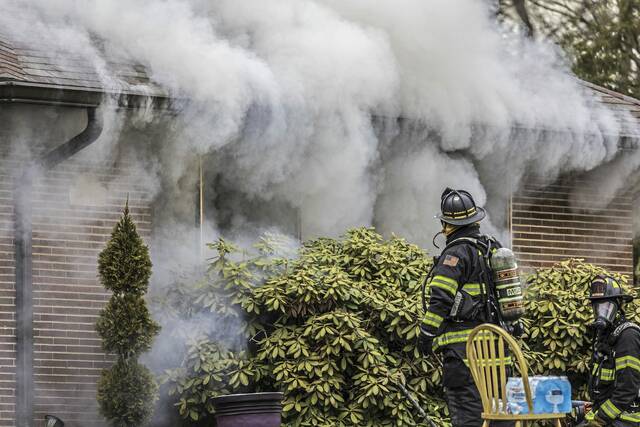The Pennsylvania Supreme Court heard arguments Tuesday morning on whether a man convicted of killing a family of three in a fiery Thanksgiving 2016 crash in North Versailles ought to be sentenced to a mandatory term of life in prison.
Demetrius Coleman, 28, of Pittsburgh’s Homewood neighborhood, was accused of fleeing from a traffic stop the afternoon of Nov. 24, 2016, at speeds of 100 mph. He slammed into a Ford Taurus carrying Kaylie Meininger, her fiancé David Bianco and their 2-year-old daughter Annika.
The family was killed instantly.
A jury found him guilty of three counts of third-degree murder in March 2019.
While that offense typically carries a maximum penalty of 20 to 40 years in prison, the Allegheny County District Attorney’s Office said prior to sentencing that it would seek a mandatory life prison term.
Under Pennsylvania’s statute, anyone convicted of third-degree murder “who has previously been convicted at any time of murder or voluntary manslaughter … shall be sentenced to life imprisonment.”
Tuesday’s debate revolved around the meaning of the word “previously” and the two sides’ interpretation of the statute.
Now-retired Common Pleas Judge David R. Cashman refused the prosecution’s request for life in prison for Coleman, calling their interpretation of the statute “illogical.”
The statute “was designed to punish somebody for their repeated criminal conduct and by implication suggests that someone has committed criminal activity in the past and then has repeated the criminal activity so as to require additional punishment,” Cashman wrote.
He sentenced Coleman to 70 to 140 years.
The state Superior Court disagreed with Cashman and remanded the case for resentencing, applying the mandatory life term.
Coleman appealed to the Pennsylvania Supreme Court.
His defense attorney, Norma Chase, argued to the state Supreme Court on Tuesday that the mandatory sentence should only apply to a person who is a repeat offender — not someone whose acts occurred simultaneously.
Chase said that the word “previously” is in the statute to indicate there is not a limit to how old a conviction can be to apply.
“It comes down to paying attention to common sense,” she said.
Chase asked the court to look at the language in the next subsection of the statute, which says that the sentencing court, prior to imposing a sentence, should “have a complete record of the previous convictions of the offender.”
That language implies that the statute doesn’t apply in a case involving simultaneous deaths, Chase said.
The Defender Association of Philadelphia, which filed a brief on the matter in the case, agreed.
The statute “is designed to punish repetition of homicidal acts, not to address a single and indivisible homicidal act which unintendedly causes multiple deaths,” the association wrote.
“When a single jury in a single trial renders a guilty verdict … on three counts of third-degree murder, no conviction is beforehand or antecedent to any other conviction,” it added.
Assistant District Attorney Daniel Vernacchio argued Tuesday that the statute’s language clearly states “previously convicted at any time.”
He told the court that “‘at any time’ can and should be interpreted literally. In other words, there is no previous conviction too remote, nor too recent, to be exempt from the rule.”
Vernacchio argued that the mandatory life term applies in every scenario, for both repeat offenders and simultaneous deaths.
The Supreme Court will rule on the matter at a later date.








